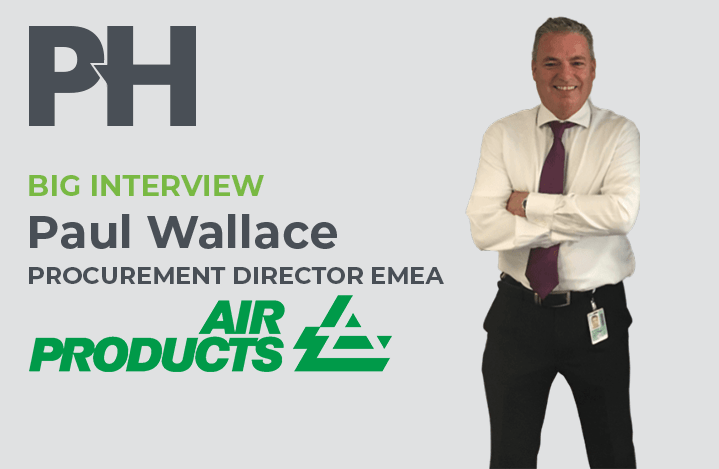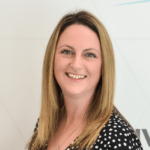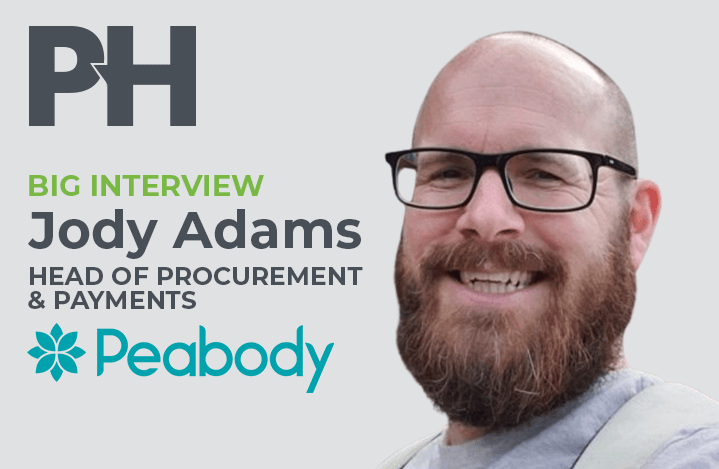How did you get into Procurement?
That’s an interesting one… I’m actually a finance guy at heart!
I studied with CIMA and with 16 years in finance under my belt at Air Products, I then moved into various Supply chain roles before heading up the Supply Chain team in one of our divisions and then moving on to running the business for one of our larger divisions.
Then, when Air Products reorganized the Procurement function to make it more business-aligned, I was told, ‘with your background in finance, supply chain and business acumen, you’re the guy to go into the role!’ – and that’s how I got into Procurement! It was new to me and, I must admit, I leant on a few people heavily in the early days. It was a real upward learning curve.
What does a typical day at work look like for you?
When I worked in finance, I’d always have a good understanding of what my day would entail, but I have found that Procurement has surprises!
These can be from a stakeholder, a vendor or something that has cropped up within the team. When you’re a leader of a group, talking with your team really matters.
If you’re one of these people who sits in an office with the door shut clinically working away, you lose that vital engagement with your team.
Because my role encompasses strategic sourcing, operational Procurement, real estate, facilities and project management; a day for me can be a pretty wide scope of activity and that really suits me. I’m not sure my brain is best suited to doing the same thing for a long period of time!
A ‘typical’ day for me consists of a mix of internal and external meetings – typically vendor discussions. I don’t actually have any vendors that I look after myself, the role I play is very much about supporting my team, and I hope they see that.
When I’m involved in these discussions it means the relationship is particularly important – there could be a challenge we’re facing or we’ve identified an opportunity to do something differently.
What do you love about Procurement?
I love how dynamic Procurement has become.
When I interview people with the perfect Procurement technical skills, I’m looking for something more. I’m looking for emotional intelligence that they can demonstrate – I rank that very highly, so I use Hogan and other tests to help me with this.
Once we’ve got the right people in the roles, it gives me great pleasure to see them grow and develop.
I really enjoy seeing the results.
We have a strategy in place which means I can easily see where we are now compared to where we once were – and a lot of that is driven by the ability of the people. We really have upskilled our people and we’ve invested in more training too.
We still have challenges around some of our tools and processes, so that’s where we’re spending a lot of our time at the moment.
You mention the tools and processes being a slight challenge, is there anything else that you see as particularly challenging at the moment?
Over the years, Air Products has acquired many, many vendors. We have accumulated so many, that lately, we’ve been doing some continuous improvement work to look at some of the technical equipment we buy and how we can better manage the vendors we have and need.
We’ve also identified that our data needs a lot of cleaning.
Trying to look at category management is only good if the data is in the right category in SAP.
We recently invested in a Procurement Analyst and I would say that’s one of the things that’s made a huge difference, not only does it mean we’re getting the information we need quickly and efficiently, but the team of buyers and sourcing professionals are able to focus more of their time negotiating, driving changes and improvements.
This improvement in our analytical capability has had a substantial improvement on the way we operate as a whole team.
It’s a recommendation I’d pass on to others – and having spoken with other CPOs, they have invested heavily in that space and see this as the future of procurement in the world of digitalisation.
You must have the right spend tool too – about 12 months ago we transferred away from our SAP products, to a more efficient cloud-based sourcing tool and a new spend analytics tool.
When you read articles about the best tools to use, the ones that we have chosen are in the top 3 from a user view point, so I congratulate the people responsible for this – they chose well!
The capability of these tools is vastly superior; for example, the time it takes us to go out for a bid has now halved which has completely enriched our Buyers’ time!
We’ve done a lot of work on where their time is best spent, and changing processes they find that add little value – we’re never going to address it all completely, but we’re certainly ahead of where we were a few years ago.
What has been your biggest achievement in your Procurement career?
One of the things I noticed when I came into Procurement, was that there was no representation at the regional leadership or management tables for me or any of my teams across the various regions that I am responsible for.
That created hurdles when I was trying to push changes through or get recognition for the team and their work.
So, we introduced a Procurement Contract Tender board by sub-region which is essentially an in-depth discussion with the sub-regional Procurement Manager, the sub-regional Vice President, the Director of Portfolio Management and myself to really analyse where we’ve spent money in the last quarter, and where we’re going to spend it in the next quarter.
The reason we do this is to identify opportunities to challenge sole sources, ensure bid strategies are aligned to business needs, review savings, identify any supply chain contract risk and identify any pre-committed spend.
In some cases, Procurement is responsible for rubber stamping but they have no say in negotiating. As a result of these meetings, we have now reduced pre-committed spend to nearly zero, previously standing at 20% in some regions.
Also, the work we’ve done in upscaling the teams and their tools has enabled us to see a 50% improvement in deliverables over the last 3 years. I’m very proud of that. But, the challenge now is – how do we continue to push this and become best in class? Because that’s where we want to be.
Have you observed any trends within Procurement recently?
I’ve noticed that negotiations are less face-to-face – we’re moving towards more technology-driven phone or email-based negotiations – so the skills we need from our people are different as a result – you have to be able to be more dynamic.
The targets are only getting higher year by year and we need tools in place that are quick and easy to use. We also need our processes to be simple to follow, with those who work within them having a clear understanding of what their roles and responsibilities are.
Something I noticed when starting out in Procurement was that people were a little unsure of the role of Procurement and how it worked.
One of the things we’ve been looking at is how we can simplify the entire process to create a better understanding for all, and there’s more to come on that.
People skills are another area where I’ve noticed a trend. Excellent emotional intelligence and softer skills are vital for Procurement teams.
I read an article that said that five years ago those skills and competencies weren’t even in the Top 10 for Procurement professionals, and they’re now in the top 3.
I can see these becoming a ‘must have’ during the recruitment process. If the technical interviews are good (and you can test that easily), then I look for a team and cultural fit, appetite/desire, and an idea of how far I can push and test them. Even if they come in qualified, the training doesn’t stop there.
What do you consider your greatest strengths and weaknesses?
I think my greatest strength is identifying what will develop a person, and also identifying when there can be a need to keep it simple to drive improvement.
I have a strong appetite for change.
As a result, I’ve worked across many different parts of Air Products over the years and in each different role I’ve enjoyed helping people to grow and develop.
I like to spend more time on the human element of the role, I like to understand what I can do to really make somebody tick – getting to learn what they’re good at. If the opportunity arises to develop a person and invest in them to grow, not just as an individual but as a team, then I’ll take it.
My greatest weakness over the years has probably been trying to do too many things and losing focus. I have noticed that if there’s something new to the business, I like to help set it up and get it in place, but I have learnt that I need to hand it over to a better-placed person to operationalize it once I’ve done my part – it’s important to play to the strengths of the team.
Also, from a communicative stance, having worked for an American company for a long time, I can at times be very direct. But, in my defence, I do believe that it’s important that people know what you’re thinking!
What has been the best lesson you’ve learnt in Procurement?
I’ve come to realise that the first 90 days of any role are so important. I’ve learnt that the most effective approach to this is to just observe and understand the people you’re working with, and the project that you’re dealing with.
Before you jump in with a remark or a suggestion, learn where the opportunities really are and how your remarks or suggestions will be received.
I’ve also learnt that you must always place your best people in the right arena. I’m lucky enough to say that the management team I have in place now is probably one of the strongest I’ve ever had, and I’ve been managing cross-country teams since the mid-’90s.
Unleash the talent if you have it! If you get it right, it’s really one of the fastest ways to drive improvement in a business.
Your success with this comes down to the quality of the person, the structure you’ve put them in, combined with the tools and everything else that you provide them with.
Who has had the most influence over your Procurement career?
As I mentioned earlier, when I first started out in Procurement there were a few people I leant on to get me up to speed.
I asked so many questions, “Why do we do this, why do we do that, how do I do this?” – I must have driven them crazy!
I also had the pleasure of working for a Vice President who had also come into Procurement from the business area and his advice was key to my success.
I joined a professional procurement body that gives us a lot of introductory network discussions with other like-minded procurement professionals on similar topics.
I try and attend 6-10 events a year for networking, and that has paid off in terms of best practice sharing, process improvements and getting myself more grounded on the changes taking place in the Procurement sector.
Articles, like this Big Interview, provide their own influence over my career, too.
It’s not just about pushing my name out there, it’s more about connecting Procurement professionals and helping them find out what’s happening in the external market, putting people’s ideas across and learning what others in the profession have to say – that intelligence in an organisation as big as ours isn’t always so forthcoming. For me to get this, it’s so important.
That’s why I was so happy to do this Big Interview.
What do you enjoy doing in your spare time?
I read a lot – mostly factual. I like Formula 1, and I’m a bit of a crazy football fan! I still play (although my body is probably telling me I shouldn’t!) but I really enjoy it.
In my head, I still think I can score many goals!
I’m a huge Arsenal fan – I have a season ticket and it’s the only team I’ll let my daughters support! Luckily, my partner is absolutely mad about football as well, which is great!
I also travel wherever and whenever I can. I get a few travel magazines each month for ideas, and then my partner and I choose a destination – we can travel alone these days, now our Children are a little older, which is nice.
I like to travel to new destinations each time and to learn all about the culture! I think if we all spent a little time learning about each other, the world would be a better place.
Is work/life balance important to you? And how do you achieve it?
My work is very important to me.
When my daughters were young I chose to live quite close to the office because I knew the hours I’d face would be quite long.
I wanted to be the dad that got home and saw his daughters in the evening, and it was very important to me to know that I was playing my part, both at work and as a dad to the best of my ability. In this day and age, we are asking people to work harder – not just with their time but with deliverables as well.
I always try and manage my time as best I can.
There have been times that I’ve had to work or travel over a weekend, it goes with the job, but in return, Air Products is very accommodating should you need time off for anything.
It’s an organisation that looks after its people hence why I, and so many others, have been here for such a long time.
Whenever you speak to somebody that has left, for whatever reason – better chances to grow and develop maybe – they all say they miss the people which I think speaks volumes.
Procurement Heads‘ Big Interview Series features Procurement Professionals throughout London, Hampshire & Dorset, Surrey & Sussex, Berkshire, Oxfordshire & Wiltshire.
It’s an opportunity to shed some light on the specialist world of Procurement and those who work within it. If you’d like to feature in our next Big Interview, contact us at 01962 869838 or drop us an email: info@procurementheads.com






